
PART TWO OF OUR CHAT WITH THE LEGENDARY SCI FI AUTHOR FOCUSES ON FILM PROJECTS LIKE SOYLENT GREEN
By JEFF GOLDSMITH
A blood drenched arm desperately reaches up from a cathedral floor, and grabs the arm of a police chief. The chief is dragged in closer to a rugged cop, who utters what may possibly be his last words, "It's people! Don't you understand? Soylent Green is people!"
That cop was Charlton Heston, the film was SOYLENT GREEN and the year was 1973. SOYLENT GREEN proved to be a success for MGM that year, and even managed to win itself a Nebula Award as the best Sci-Fi film of the year. Now, 26 years later, in part 2 of our Harry Harrison interview, we'll take an intimate look back at how Hollywood gave Harry Harrison the SOYLENT TREATMENT!
Before the interview, let's get caught up on the differences between the book and the film. Both works are set in an immensely overcrowded future. Families live in stairwells, doorways and streets as society is just about nearing its breaking point. In the film, Soylent crackers are the main source of the public's food. Limited supplies of Soylent crackers are rationed to the public daily and the crackers are a different color for each day.
During the film, we follow the exploits of one Andy Rausch (Heston), a city cop investigating the murder of a rich Soylent Corp. executive named Simonson. Each exclusive apartment in Simonson's building comes complete with 'Furniture'; a slang term used for the live-in girlfriend supplied as a perk to every apartment. While investigating the crime, Andy quickly falls for Simonson's 'furniture', Shirley, and talks of having her move in with him and his elderly roommate Sol (Edward G. Robinson).
During Andy's investigation, Sol has found out a secret so terrible, that he's decided to head for 'Home'. 'Home' is a state-run suicide clinic which gives you a glass of poison wine and a nature IMAX-styled film presentation before your death. Andy arrives too late to save Sol, but does secretly follow his body on a conveyor belt, which leads him right into the middle of, you guessed it, the Soylent Corporation. The film's final revelation is that human bodies are being used to make the Soylent crackers. Mankind has run out of food. The film ends, as described above, with Heston giving the chief a desperate confession after being wounded by Soylent's security force.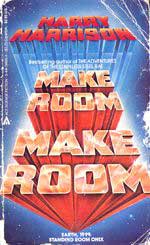
The film differs from Harrison's book, entitled MAKE ROOM! MAKE ROOM! in that Soylent Green ISN'T people in Harry's book. If you can believe it, Harry provides us with a much darker world than the film. We follow not only Andy's tale, but also the tale of an impoverished teenager named Peter Chung. Peter is a boat dweller, one of thousands who live in sinking boats strung together for miles into the NY harbor. You can see some light shed on this concept in the film THE FIFTH ELEMENT, where the NY Harbour has been stretched all the way to the Statue of Liberty.
It is Peter Chung who kills the Simonson character during a foiled robbery at Simonson's apartment. There was no conspiracy involved. Andy still investigates the crime and falls in love with Shirley, and in Harry's book they actually do move in together and share the place with Sol. Things take a dark turn when Sol dies of natural causes and a crazy family suddenly moves into Andy's apt. Under a new law, this family of squatters is legally allowed to hang out at the city morgue to see who dies, and then move into whoever's apartment they deem suitable for 'family living'. The crazed family seriously gets on Shirley's nerves and she leaves Andy. During the apprehension of Peter Chung, Andy accidentally kills the boy, which leads to the chief putting him on suspension for not backing down on the case in the first place.
As the clock ticks down the final minutes of the millennium, a disheartened Andy watches from a distance as Shirley jumps into the limo of her new rich 'owner'. At the end of Harry's book, there is no evil Soylent organization to vent our anger against, we're only left only to blame ourselves for letting the world fall into ruins.
With the above in mind, let's move on to hear from the man himself.
JG: 'Monday, August 9, 1999' is the date on the opening page of your 1966 book, 'MAKE ROOM! MAKE ROOM!' and that date is nearly upon us! Of course, your work easily extends itself into a not so distant future. With that in mind, what do you think of the world's overpopulation problem today?
HH: It's gotten worse since when I wrote the book. Taking on overpopulation hadn't really been done and after researching the problem, I made the worst prediction I could and it wasn't bad enough.
JG: So you feel that we are in the midst of a crisis today?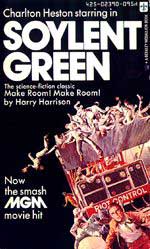
HH: Absolutely. I know you were joking around before about how the date in the book is nearly upon us, but you've gotta remember that the book itself was written as a warning of what may happen, as opposed to a prediction of exactly when and where.
JG: Of course, and yes, I was prodding you with my first question. Your book is a warning of what may happen, and still could happen; just as Orwell's 1984 isn't so much about the year 1984 as it is about the terrors of an ultra-fascist government which sells itself as your protector.
HH: Right-O, and just as I wasn't trying to predict that NYC was going to be the center of an overpopulation crisis, although they're certainly campaigning for it, if you really stop and take a look around today, you'll see a lot of interesting things occurring. Europe is reaching ZPG (Zero Population Growth), like in Germany for example. The rich are getting richer and enjoying life; concentrating more on the first refrigerator or television than the first or second child. People are enjoying their lifestyles and their wealth, and don't want to bother sharing it. We're not dying, we're happy. Meanwhile, in Africa they're dying of starvation, and an onset of horrible diseases. Unfortunately, it's gonna get worse before it gets worse.
JG: Which is exactly the message of your book.
HH: Yes. The sad part is, if we wanted to, we could do something about it. It all just boils down to sex, I guess. Even the supposedly advanced countries are still taking their baby steps towards the concept of public birth control education and developing strategies towards population control methods. Our leaders continue to lead us backwards on these issues.
JG: Do you think that might be because it's mostly a problem for underdeveloped countries/populations, which don't yet pose an immediate threat to an affluent society like our own?
HH: Sure, as history has shown us, the rich will always have the means to look after themselves, while the poor wither away. One of my concepts in MAKE ROOM! MAKE ROOM! was to show what happens when the standard of living begins to go down for everyone. In the book, the rich are still kind of well off, but you're forced to question how long it's going to hold out for them, or are they really well off in the overpopulated world which I set up.
JG: That aspect somewhat made it into the film SOYLENT GREEN, as even the rich were forced to live within certain limits. Speaking of the film, tell me how the process of going from the page to the screen began.
HH: I'd say the genesis of this film began as many have in the past; with the author getting screwed.
JG: What happened?
HH: Oh, they got me good. A lawyer called my agent to tell him how much he loves my work and wants to make it into a film, but that he didn't have much money. Being nice guys, my agent and I agreed to a modest option fee and a low buyout price for the overall rights. All with the promise of decent backend points which would lead to a greater payment if the film does well. Soon after the ink dried, we learned that we optioned the work to a dummy corporation which was essentially a front for Charlton Heston's production company along with MGM.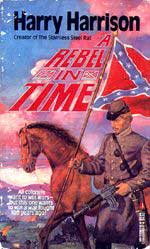
JG: Whoops.
HH: Yeah, they then paid the reduced rate we negotiated and to this day I've never seen another cent. Because, don't you know it Jeff, according to the powers that be, SOYLENT GREEN never turned a profit. Even though it enjoyed quite a success during its release and has since become a cult classic on TV and video, it somehow is still in the red. Suspiciously while SOYLENT GREEN did make money for MGM that year, they were also taking a bath on the film THE LAST WALTZ, which lost millions. I've always assumed that they used our success to offset that loss.
JG: Welcome to Hollywood.
HH: Thanks. In all seriousness, yes--they did get me, but they ended to be a good group of people who wanted me involved with the entire production of the film. I'm a writer first, and it was a great honor to have my work brought to the screen, even though they gutted my book like a dead fish.
JG: Let's talk about that for a second, what are your thoughts on how they changed your work for the screen?
HH: Well, they got the rights to my work and then MGM decided that overpopulation wasn't really enough. So, with the screenwriter, Stanley Greenberg, they decided to somehow reduce the work down to a cannibalism tale. He wrote the script and then just disappeared. I don't think he cared, it was just a gig for him; he was off to the next thing by the time they were filming. It's always difficult to convert a book to the screen, I know that, that's why I wasn't totally surprised when I learned just how much they were changing things. I didn't really like the script, but knew that the next phase of the process, production, still held the chance to amend the damage which the script had done. Luckily I was able to be on set and make suggestions that ended up helping to bring the film back a bit closer to my book.
JG: How open were they to your comments?
HH: Completely open to them. There's a scene where Shirley goes shopping at a rich grocery store that offers real food and they had everything wrapped in plastic, and I interjected that plastic is derived from oil and in this world resources are slim. Shirley would really bring in her own bag, and the food would just be laying out. They immediately integrated that change.
JG: Were you involved with the opening of the film?
HH: They got Chuck Braverman to do it. He and I talked and they did throw out their previous ideas and took on Chuck's brilliant pictorial montage which links the problems of today with those that lie ahead of us.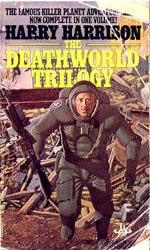
JG: He also was responsible for supplying Sol's final visions in the suicide parlor scene, right?
HH: Right. He did an excellent job with that.
JG: How did you feel about the introduction of a suicide parlor into your story?
HH: It's an old science fiction gimmick. I certainly never would have written something like that, as it just wouldn't have worked. But, after seeing it on film, I did decide that it fit in quite well for the film, mainly because they did such a good job of it. The set design was great, they did have some really great technical accomplishments throughout the film.
JG: Was anything major cut out of the film?
HH: Oh, there was a scene with Chuck Connors (Shirley's bodyguard in the film) protecting her from a riot--which was right out of my book, but of course cut out of the film. They also cut out Eddie Robinson somewhat blaming the government and the church for having such weak policies on overpopulation. Somehow they decided that they wanted the controversy associated with the cannibalism, but not any of controversy associated with the substance of my book!
JG: Sounds typical. How warm of a welcome did the crew give you?
HH: Very warm. The technicians are the most important part of the process, as they make it work. One of the first things I did was to give every single crew member a copy of my book, which as you can imagine was a practice which they were not used to. But, many of them read it and enjoyed it and had a better understanding of what they were doing. I think it helped for the morale, as everyone felt involved and would talk with me about it.
JG: What was it like to work with Edward G. Robinson on his 101st and sadly his last film?
HH: Eddie was a great guy. I heard him one day talking to the director about his character and how many things in the screenplay didn't make sense. So, I introduced myself to him and we went and had lunch together. I explained to him that he is the only link with the 'old world', and once he understood the significance of that, he fell in love with his character. In fact, Eddie created that scene where he and Heston have a real meal and Eddie shows him how to eat a real meal. That scene is so great that you can even see wooden Charlie Heston acting and marveling at what Eddie was doing. The crew clapped when they wrapped the scene, because everyone agreed that it was such a great thing to add to the film.
JG: You must admit, it was quite ironic the way he takes his life within the film and then died in real life after the film wrapped.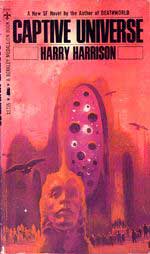
HH: Yes. Eddie was a great man who had a zest for life. He kept his cancer a secret to us during the filming because he wanted to work in order to keep his mind off of his illness. He knew it was terminal. When he did die, the studio considered cutting his suicide out of the film and trying to do a version where he doesn't die in the film! They thought it would upset the public too much. Forget the public, I think it would have upset Eddie! I knew they didn't have a chance of changing something that major in the film, so I wasn't worried. In the end the public didn't have a problem with it and his great performance remained untouched. Eddie saw the dailies, which he enjoyed, but didn't live to see the finished film.
JG: What was it like to work with Sci-Fi crusader Charlton Heston?
HH: He was very professional and a nice guy, but after the first few meetings we hardly spoke that much. He showed up, did his scenes and that was it.
JG: Any tales on working with film legend Joseph Cotten? (Simonson in the film)
HH: Nice guy, worked on the film one day, no major tales to tell. Chuck Connors (Shirley's bodyguard) was a lot of fun to work with. He loved the book and I remember he once jokingly yelled at Dick Fleischer, the director, about how much he hated the title SOYLENT GREEN and wanted to know why they weren't naming the film after my book. As it ended up, there was a Danny Thomas film called MAKE ROOM FOR DADDY which was something that had been dead for over ten years. The studio was convinced that the public would somehow confuse our work with that, so, there ya have it. You can just never underestimate the stupidity of some of the people in Hollywood....
JG: You're preaching to the choir.
HH: This was the same group of people who had the amusing idea of releasing the film on a Tuesday, as in the film Tuesday is Soylent Green Day. They rescheduled at the last minute as some genius pointed out that the Tuesday they'd picked happened to be the Jewish holiday of Yom Kippor, a day when no one eats!
JG: That's hilarious.
HH: I still feel the title is weak. Look, they didn't even know what Soylent was! No one ever asked me!
JG: Funny enough, that was my next question, what is it?
HH: In the book I mention Soylent burgers. I made up that word by doing a combo on Soy Beans and Lentil, to get Soylent. I'd always imagined they'd only have vegetarian food. In the film they call Soylent 'The miracle plankton food'. Well, plankton is microscopic! I'd love to know what kind of food they were making out of algae?! It's really a laugh when you think about how confused those guys were.
JG: Yeah, especially since in the film Sol is driven to suicide when he learns that the oceans are dead, thus depleting the Soylent supply.
HH: Right, that was so silly that I've forgotten about it. Hell, there was even an omen to have them call it MAKE ROOM! MAKE ROOM!, as this was the last film shot on MGM's old backlot which was ripped down to make room for some condos!
JG: Would you like to one day see a remake of your book with the correct title?
HH: Only if they delved back into my text and didn't try to remake the other film. I agree with what we talked about earlier, how in my book you blame humanity for all of the problems, while the film confuses these very real issues and essentially ends up a bunch of bad PR for the non-existent Soylent Corp. We need to question ourselves, and try to change our ways before it's too late.
JG: What current film projects are in the works based on your novels?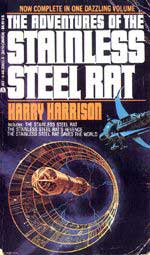
HH: Quite a few actually. I believe the STAINLESS STEEL RAT is being shopped around and may find a home sometime soon. Mel Gibson's company, Icon Pictures, has the rights to THE TECHNICOLOR TIME MACHINE and had a pretty decent script generated. There's even a company called Unlikely Films who've taken three of my old short stories and are turning them into one film. So who knows, my work may arrive again at a screen near you, and hey, maybe I'll even end up directing it.
JG: Really?
HH: Sure, who knows, I'm a young guy.
JG: Indeed. Going back again into your past brushes with film, tell us about your experience with the animated film HEAVY METAL.
HH: I wrote a screenplay, it got tossed around, and then someone made it a Canadian co-production; which needs Canadian talent involved in order to qualify for their tax breaks. So, they gave me a kill fee and turned it into a completely different film than what it started out to be. Six months down the drain. It was upsetting because after all that work I couldn't have cared less about the cash, I wanted to see it brought to the screen.
JG: What kind of films do you like?
HH: I'm a film buff, I love classics like CITIZEN KANE, who doesn't I guess, but I also love all the work of Sergei Eisenstein. I actually think I ended up on an FBI list for attending that Russian filmmakers films here in the U.S.! He was a great artist, he designed all his shots and I've always respected him.
JG: Last question, are you a looking forward to the next batch STAR WARS films?
HH: I liked the early ones from the last batch, got a bit worried about where he was going with the 'franchise' towards the end. It was real amusing to see some of the stuff recycled from the old pulps in those films. One of the covers for one of my stories involved a desert creature with a big stick and rags on his head, I seem to remember that image popping up in his film.
JG: Sure, the Tusken Raiders on the desert planet Tatooine.
HH: Something like that. Maybe I'll go see it when it comes out. Hopefully it'll be good, I just don't want to see too many more Sci-Fi films dumbed down. Serious Sci-Fi doesn't necessarily have to be serious, it just has to be smart. I'm sure serious Sci- Fi will eventually come back, it's just a matter of when.
JG: The sooner the better. Harry, thanks again for giving us at EON such a great insight into the making of SOYLENT GREEN.
HH: Always a pleasure, and thank you all for your interest.
ISSUE 13.2 - FEBRUARY 19, 1999